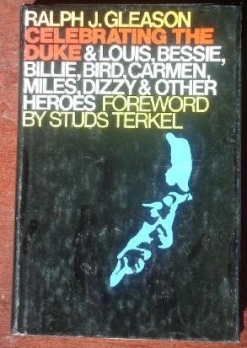
Celebrating The Duke: And Louis, Bessie, Billie, Bird, Carmen, Miles, Dizzy And Other Heroes
Ralph J. Gleason
1975 / Hachete Books
Review by Steve Yip
Once in a blue moon as they say, one may come across a gem that should not be bypassed. While visiting Revolution Books NYC in Harlem, I was perusing their used book cart. Revolution Books has a lot of quality used books parked outside its entrance on the sidewalk along Malcolm X Boulevard -- mainly donated by bookstore denizens, students and retired professors, and book lovers who dispersed their reading materials due to the need to open up shelve space or to maintain some semblance of traffic walkways in their cramped New York apartments.
I immediately spotted the name Gleason on the spine of the weathered dust jacket, and pulled the book out of the slotted hard and soft cover books crowded and lined up together.
Voila, it was Celebrating The Duke: And Louis, Bessie, Billie, Bird, Carmen, Miles, Dizzy And Other Heroes, a book by Ralph J. Gleason, the late jazz music producer and columnist for the San Francisco Chronicle.
I grabbed that bad boy and gleefully celebrated my great luck by leafing through and examining the table of contents. Inside the opened flap of the dust cover, I found an quote by Miles Davis that jumped out: “Ralph Gleason! I read him. He understands me.” I was smittened.
Celebrating The Duke... was published in 1975 at the year of Ralph Gleason’s death at the young age of 58. It is a powerful poem to the legacy of the great composer and band leader Duke Ellington and many of the beloved pioneers of modern-day jazz music -- including Bessie Smith, Louis Armstrong, Jimmie Lunceford, Lester Young, Charlie Parker, Albert Ayler, Dizzy Gillespie, Miles Davis, and John Coltrane.
Ralph Gleason’s writing is affectionate with tremendous insightfulness and not overbearing nor academically inclined. He does reserve much accolades to Duke Ellington, whom he calls “America’s greatest composer.” One could get teary-eyed just traveling through the last third of the book called “A Ducal Calendar 1952-1974”. Several of the essays are taken from albums liner notes or taken from his music column from the San Francisco Chronicle beginning from the late ‘50s to the late ‘60s.
In his introduction, followed by an opening essay ”Jazz: Black Art/American Art,” does not pull punches where he essentially scolds and indicts this racist society for failing to recognize the monumental musical contributions by Duke Ellington and other early Black jazz pioneers who rose from oppression and systemic discrimination to leave deep indelible stamps on U.S. and global culture. Here is a sampling: “America has long neglected Duke Ellington. London had an apartment house named for him in the 30s and he has played command performances for the queen. Oddly, his autumnal recognition does not come as a serious composer...”
In his last chapter, Gleason writes how various elements in the business tried to keep Ellington hemmed into a segregated musical ghetto -- derisively calling it “jungle music”, “For at least the first half of his career, his managers and others did their best to keep that music and to keep Duke firmly in the category of entertainment. But Ellington knew from the beginning that he was more than a bandleader and more, even than the composer of popular songs.”
In the essay written after the Duke’s death, and for the piano music readership, Gleason expands his appreciation of the maestro’s underappreciated proficiency of the piano itself, “Duke dominated the keyboard. He played all of it, sometimes his long arms extending from the bottom of the bass to the top of the treble. He not only had the scope to play the entire instrument, but he understood, as very few pianists understand, the use of the pedals for special effects. Duke was a master at this.”
Ironically, I had been thinking offline about finding a book by Gleason. For some time as I had been one of his admirers of his work as a cofounder of the Monterey Jazz Festival, and his cofounding with Jann Werner of Rolling Stone Magazine. An established and recognized jazz critic (with an open line to Ellington, it seems), Gleason was early in hailing the cultural shift represented by the post-Beatle new rock music scene coming out of San Francisco’s counter-culture movement. As a teenager, I followed his columns in the San Francisco Chronicle. His book Jefferson Airplane and the San Francisco Sound was published in 1969!
I know, I know, this is an old book. And yes, this review is a straight-up appreciation of Ralph J. Gleason himself. You can find a recent 1995 paperback reprint by Da Capo Press with a new introduction by the critic and historian Ira Gitler at your favorite book dealer.
[Updated September 11, 2024]
September 11, 2024

